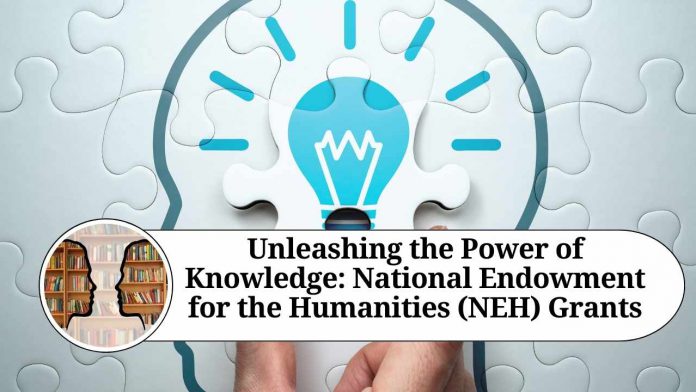Introduction
In a rapidly evolving world driven by technological advancements, it is crucial to nurture and preserve our cultural heritage, promote intellectual growth, and foster a deep understanding of the human experience. The National Endowment for the Humanities (NEH) has been at the forefront of this mission since its establishment in 1965. Through its grants, the NEH empowers scholars, educators, and cultural institutions to undertake transformative projects that contribute to the enrichment of our society. In this blog, we will explore the significance of NEH grants and the impact they have on promoting the humanities.
Understanding NEH Grants
The NEH is an independent federal agency in the United States dedicated to supporting research, preservation, and educational initiatives in the humanities. NEH grants are highly competitive and awarded through a rigorous review process, ensuring that the most deserving projects receive funding. These grants span a wide range of disciplines within the humanities, including history, literature, philosophy, archaeology, linguistics, and more.
Categories of NEH Grants
- Research Grants: These grants enable scholars to delve into critical areas of study, providing funding for individual or collaborative research projects. Through NEH research grants, scholars can expand the boundaries of knowledge and contribute to the understanding of our diverse human experiences.
- Preservation and Access Grants: Cultural institutions, libraries, museums, and archives greatly benefit from NEH grants dedicated to preserving and providing access to important historical documents, artifacts, and collections. These grants support initiatives such as digitization, conservation, cataloging, and the development of online resources.
- Education and Public Programs: NEH grants also play a pivotal role in fostering educational initiatives that promote the humanities. These grants support the development of educational materials, curriculum enhancements, public lectures, exhibitions, and community programs that engage a wide range of audiences.
- Media Projects: NEH recognizes the power of media in disseminating knowledge and promoting the humanities. Through media grants, the NEH supports the production of documentaries, films, radio programs, podcasts, and digital platforms that explore various aspects of human history, culture, and ideas.
Impact of NEH Grants
NEH grants have had a profound impact on numerous individuals and institutions across the country. They provide crucial funding for projects that promote a deeper understanding of our collective heritage, inspire critical thinking, and foster cultural appreciation. Here are some examples of the impact of NEH grants:
- Scholarly Advancements: NEH grants have supported groundbreaking research, allowing scholars to make significant contributions to their respective fields. From unearthing archaeological treasures to uncovering lost manuscripts, these grants have expanded the boundaries of knowledge and enriched academic scholarship.
- Cultural Preservation: Through NEH grants, precious historical artifacts and documents have been preserved, ensuring their accessibility to future generations. The digitization of rare manuscripts, the restoration of historical sites, and the conservation of valuable artworks have all been made possible through NEH funding.
- Public Engagement: NEH grants empower cultural institutions to create educational programs, exhibitions, and public events that engage diverse audiences. These initiatives stimulate public discourse, promote understanding, and encourage lifelong learning.
- Economic Stimulus: NEH grants not only contribute to intellectual growth but also have a positive economic impact. By supporting cultural institutions and scholars, these grants foster job creation, tourism, and the development of local economies.
Conclusion
The National Endowment for the Humanities (NEH) grants have played a pivotal role in advancing the humanities and preserving our cultural heritage. By supporting research, education, preservation, and media projects, NEH grants enable scholars, institutions, and communities to explore and celebrate the rich tapestry of human experiences.
Read more useful content:
Frequently Asked Questions (FAQs)
Q: What is the National Endowment for the Humanities (NEH)?
A: The National Endowment for the Humanities (NEH) is an independent federal agency in the United States dedicated to promoting and supporting research, education, preservation, and public programs in the humanities.
Q: What is the purpose of NEH grants?
A: NEH grants aim to provide financial support to individuals, scholars, educators, and cultural institutions to undertake projects that contribute to the advancement of the humanities. These grants help foster intellectual growth, preserve cultural heritage, and promote public understanding of various aspects of human history, culture, and ideas.
Q: What types of projects are eligible for NEH grants?
A: NEH grants support a wide range of projects within the humanities. Some examples include research projects, preservation and access initiatives, education and public programs, and media projects such as documentaries, films, podcasts, and digital platforms.
Q: How does the NEH grant application process work?
A: The NEH grant application process typically involves several steps. First, applicants submit a proposal outlining their project and its significance. The proposals undergo a rigorous review process by expert panels and external reviewers. Final decisions are made based on the merit of the project and the availability of funds.
Q: Who is eligible to apply for NEH grants?
A: Eligibility criteria for NEH grants vary depending on the specific grant program. Generally, individuals, scholars, educators, non-profit organizations, cultural institutions, museums, libraries, and colleges/universities are eligible to apply for NEH grants. Some grants may have additional requirements or restrictions.
Q: How competitive are NEH grants?
A: NEH grants are highly competitive due to the limited funding available. The application process involves a rigorous review by expert panels and external reviewers who assess the quality, significance, and feasibility of the proposed projects. It is essential to submit a well-prepared and compelling application to increase the chances of receiving funding.
Q: How much funding do NEH grants provide?
A: The amount of funding provided by NEH grants varies depending on the specific grant program and the scope of the project. Grants can range from a few thousand dollars for smaller projects to several hundred thousand dollars for larger, multi-year initiatives.
Q: Are NEH grants limited to projects within the United States?
A: While the NEH primarily focuses on supporting projects within the United States, there are some grant programs that may have international components or partnerships. It is important to carefully review the eligibility requirements for each grant program to determine if international collaborations are permitted.
Q: Can an applicant submit multiple grant proposals to the NEH?
A: Yes, applicants are generally allowed to submit multiple grant proposals to the NEH. However, it is crucial to carefully review the guidelines and restrictions of each grant program to ensure compliance with any specific requirements regarding multiple applications.
Q: What is the timeline for receiving a decision on NEH grant applications?
A: The timeline for receiving a decision on NEH grant applications varies depending on the specific grant program. It is advisable to check the NEH website or contact the NEH directly for information regarding the timeline for each grant program.
Q: Can previously funded projects apply for additional NEH grants?
A: Yes, previously funded projects may be eligible to apply for additional NEH grants, depending on the specific grant program and the nature of the project. However, it is important to review the guidelines of each grant program, as some programs may have restrictions on repeat funding for the same project.




















